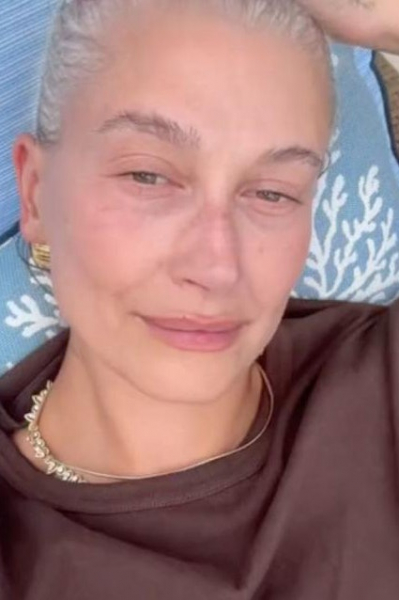
Considering its universality (there’s no escaping it, unfortunately), ageing is a strangely contentious subject. Whether due to the pressures of society’s beauty standards, or a deeper fear of change and mortality, the conversation around age – fighting it, embracing it, ignoring it – is always guaranteed to elicit a strong response. And the latest chapter in the debate has been sparked by TikTok’s “Aged” filter, which uses AI to accelerate your face’s age by decades. It’s fascinating, it’s unsettling, it’s (in some senses) natural – and none of us can look away.
Kylie Jenner provided her take – “I don’t like it,” she said, repeatedly – as did Kim Kardashian, who brought North into the frame for a mommy-and-me glimpse into the future. (I am sorry to report that North did not age at all: it seems the filter is reserved for those of us who have already begun to fret.) Dr Whitney Bowe notes that lighting affects the prominence of the filter’s effects, leading some faces to seemingly age more dramatically than others. “As a cosmetic injector, I use different angles of light in the office in order to see my patients’ skin so that my injection points are better focused and more impactful,” says Bowe, who shared an explainer on TikTok. “For example, I often have patients sitting up when I inject filler, and I use overhead lighting to accentuate the shadows, which helps to guide my needle to exactly where that patient will benefit from it most.”
“The ‘Aged’ filter raises awareness of all of the possible changes that could happen to our skin, teeth, and hair over time, so in that sense, it is a positive – but it doesn’t take into consideration our skin colour, our genetics, and lifestyle, so it’s not a definitive look into the future,” says Dr Joyce Park, a dermatologist at Skin Refinery and creator of Tea with MD. Park also hopped on the TikTok trend, using the filter as a vehicle to demonstrate how her own face (and yours) may shift with the realities of time and gravity – fine lines, eye bags, and more pronounced nasolabial folds were some of the most immediately recognisable changes. “A lot of people are getting so worried about ageing after using this filter, but there are still many ways we can intervene to age in a healthy way,” says Park.
Over the past few years, the beauty world has been increasingly unafraid to get real about ageing. The pandemic and the lack of salon access it imposed brought about a going-grey renaissance, and filler fatigue has seen a number of celebrities dissolving facial additives in favour of procedures that elicit more authentic, healthy-looking results. For skincare experts, the “Aged” filter is simply a reminder of the obvious: we should all be taking time to tend to and protect our skin. “The best skincare tip I can give is to protect your skin from the sun, which helps to prevent photoageing in the form of wrinkles, textural changes, dark spots, and more, as well as development of skin cancer,” says Park, who also lists a well-balanced diet rich in antioxidants, exercising routinely, limiting smoking and drinking alcohol, and getting enough sleep every night as essential steps. “Practising good skincare habits such as cleansing your skin nightly or using efficacious ingredients like retinoid or vitamin C helps, too.”
Bowe doubles down on the importance of a potent Vitamin C serum, used in both morning and evening routines. “Vitamin C serum is one of my holy grail products when it comes to lasting skin health, brightness, smoothness, and luminosity,” she says. “Performance packaging matters because certain forms of vitamin C oxidise and start to break down when exposed to oxygen, which happens with traditional droppers. I recommend my patients opt for airless pumps when purchasing a new vitamin C serum.” As far as procedures go, microneedling is an effective first step. “Microneedling creates a tic-tac-toe board of controlled wounds in the skin that stimulate collagen synthesis over time,” explains Bowe. “It can help with texture, minimising the appearance of pores and helping to keep the skin firm and radiant.” Fraxel lasers can help reverse signs of sun damage, promote collagen production, and slow down the depth and breadth of wrinkles and fine lines, while Botox and Dysport can be used preventatively, relaxing (AKA “freezing”) muscles to prevent a permanent etching.
We all know on a deep, human level that ageing is something we should embrace and celebrate. As Sarah Jessica Parker noted in her 2021 Vogue cover story: “What am I going to do about it? Stop ageing? Disappear?” Even more reassuring? While our current age of technology may come with tools like viral ageing filters, it also comes with scientifically backed skincare methods that are advancing as rapidly as the algorithm can age you. So, take a screenshot: Years down the line, your real-life compare and contrast may be less dramatic than you think.



